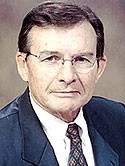President Peter Likins was in critical but stable condition last night after an emergency surgery to replace part of his pacemaker and repair a wall in his heart, something that could have been fatal if he hadn’t received immediate care, doctors said.
Likins, 69, was admitted to University Medical Center in the early afternoon yesterday with low blood pressure after he felt faint in his office and nearly passed out, said Dr. Karl Kern, the director of the Cardiac Catheterization Laboratory and a professor in the UA College of Medicine.
After the surgery, Likins was sedated and recovering in UMC’s intensive care unit, but he should be able to return home by the end of the week, said Dr. Cristy Smith, who performed the 1 1/2-hour surgery.
It was his second hospitalization since January, when Likins had the pacemaker installed to regulate his heart.
When Likins arrived at UMC, he was “”very ill”” and if he hadn’t received immediate and proper care from doctors, “”then, yes, his life was in danger at the time,”” Kern said.
Doctors ruled out heart attack and determined that the lead, or wire connecting the pacemaker to the heart muscle, had migrated and punctured an atrium, allowing excess blood to build up around the heart.
The tear and build-up must have happened abruptly because Likins had cleared a heart checkup on Tuesday, Kern said.
The excess of fluid in the pericardium sack around his heart caused enough pressure to prevent it from beating at normal pressure, but physicians drained the blood and were quickly able to get his heart back to normal, Kern said.
During the whole procedure, Likins was alert and in good spirits, Kern said.
Smith, the medical director of Cardiovascular Services and an assistant professor in the College of Medicine, said the lead of the pacemaker was replaced with a new one located on the outside of his heart.
Likins didn’t do anything wrong to cause the injury, Smith said. The problem he had with the pacemaker is not common, but it’s known to happen.
In fact, she said, his healthy lifestyle and history of exercising will help speed up the recovery, which usually takes six to eight weeks.
In Likins’ absence, Joel Valdez, the senior vice president of business affairs, will act as the head administrator, said Paul Allvin, associate vice president of University Communications.
Provost George Davis was in Austin, Texas, on business but will return today as administrators continue to plan for the weeks ahead, Allvin said.
“”That will all be sorted out tomorrow. Today we were just concerned for Dr. Likins’ health,”” Allvin said.
Karen Filippelli, the assistant vice president of finance and administration in the president’s office, said Likins was calm when medics arrived at his office and he didn’t say he was experiencing any pain.
“”He’s a really strong person,”” Filippelli said.
Likins missed at least two meetings yesterday that he was scheduled to attend, she said. At noon, Likins was supposed to speak at the Service Award Luncheon.
He was also an invited guest of the Arizona Conference on Roads and Streets, which is co-sponsored by the department of civil engineering and engineering mechanics.
Mark Hickman, an associate professor of engineering who spoke at the event, said he was informed at 12:30 p.m. that Likins would not attend, but the conference continued as scheduled.
Filippelli said though Likins works “”24/7″” and has a significant workload, his absence in the afternoon didn’t disturb the office’s operations because people worked together diligently.
“”Our team worked really well in a calm fashion and notified the appropriate people,”” she said. “”Every person contributed, which is a beautiful thing.””
Through it all, Likins maintained his sense of humor, Filippelli said.
Referring to the fake emergency response drill that happened on campus yesterday, Likins said while being carried out, “”Now see, we did have an emergency today.””
In a similarly positive mood after his first pacemaker surgery Dec. 31, Likins wrote in a letter Jan. 9 that the unfortunate episode should reassure the campus community that its president still “”has a heart.””
Likins also wrote in the letter that the December surgery was his first hospitalization since his birth in 1936.
Likins, who has been president since 1997, will retire June 30 at the age of 70 and will leave the post to Robert Shelton, the provost of the University of North Carolina- Chapel Hill.









